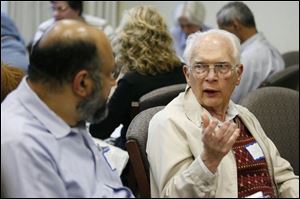
Panel: Prayer should unify, not divide
6/21/2008
S. Zaheer Hasan, left, a Muslim, talks with Bill Searles, a Unitarian, at the discussion sponsored by WGTE-TV, Channel 30, and the MultiFaith Council of Northwest Ohio.
"Congress shall make no law respecting an establishment of religion, or prohibiting the free exercise thereof. "
- First Amendment to the Constitution
In an increasingly diverse culture, how can Americans protect religious activity without promoting one particular faith?
In what way should prayer be included in interfaith or multifaith gatherings?
What were the intentions of the Founding Fathers on separation of church and state?
Five local representatives of different faith traditions gave brief talks on these topics, followed by audience participation in breakout sessions in a forum on "Prayer and the Constitution" Tuesday night at the WGTE-TV, Channel 30, studios in South Toledo.
The event was linked to the PBS affiliate's rebroadcast of a two-part documentary, Prayer in America, at 5 p.m. tomorrow and June 29. The forum was co-sponsored by the MultiFaith Council of Northwest Ohio.
Karrie Mosley, representing the Christian tradition, opened the lectures by saying there are three main challenges to public prayer: Remaining faithful to your religion without compromising your beliefs; not offending or excluding others, and steering clear of debates.
The benefits include creating a sense of personal responsibility and building national unity.
"When people ask me to pray for them, never do I say, 'What religion are you?' " Ms. Mosley told the audience of about 50. "We are able to respect one another in our faiths."
A motivational speaker, Ms. Mosley said freedom of religion strengthens Americans' sense of patriotism. She said prayer unites people in times of tragedy, when adherents of all faiths come together to pray as "one nation, under God, indivisible."
Udayan Nandkeolyar, president of the Hindu Temple of Toledo, said he has never felt discriminated against for belonging to a religion that is a minority in the United States.
He also said he was surprised after immigrating to the United States that prayer is forbidden in public schools.
"This was very, very strange to me, coming from India," he said.
Since the nation's independence from Britain in 1947, Indian students start the day off by saying a Hindu prayer in Sanskrit and The Lord's Prayer in English, he said.
"I never felt that The Lord's Prayer was a Christian prayer until I came to the United States at age 35," Mr. Nandkeolyar said.
He said it is his opinion that the U.S. Constitution does not forbid prayer or religion, but only state-sponsored religion.
"We run into trouble when we look at the words rather than the spirit of the law," he said.
Mr. Nandkeolyar spoke out against fundamentalism and said he sees different religions as different "rivers flowing into the same ocean, the same God."
Dr. Samina Hasan, a physician and founding member of the United Muslim Association of Toledo, cited numerous verses from the Qur'an and called for respect and acceptance of different religions.
She cited as an example the many centuries of peaceful co-existence in her native Pakistan among Muslims, Sikhs, Christians, Zoroastrians, and others.
Dr. Hasan likened different religious groups to trees growing in a forest, all trying to reach the sky. The variety of trees help make the forest more beautiful.
Howard Friedman, a retired University of Toledo professor, said that while prayer is important to Jews, most do not support public prayer.
"Religion has flourished because of separation of church and state. No one should be made to feel like a political outsider because of his or her beliefs," Mr. Friedman said.
Since Christianity is the dominant religion in the United States, Americans often say public prayers that are inconsiderate or offensive to other faiths, he said, such as ending a prayer with "in his name" instead of a simple, "Amen."
He said there is often an "undertone" to public prayers that implies: "We want to show you ACLU members and atheists that this is a Christian nation."
Another problem with public prayer is that the wording, when the goal is not to offend anyone, can become "watered-down pabulum," Mr. Friedman said.
"If we want prayer to remain meaningful, it needs to be more than a throwaway line," he said.
Karen Do'on Weik, co-owner with her husband, Jay, of the Toledo Zen Center, said "I am a Zen Buddhist and we don't really pray very much in the traditional sense."
She said the gift of Zen, cultivated over 2,500 years, is integrating "non-dual awareness" into everyday life.
"You simply stop grasping, stop seeking, and you dwell in the presence of God," Ms. Weik said.
She rang a bell to start and conclude a moment of silence, during which the diverse audience members reflected, meditated, or prayed quietly in their own traditions.
"It's all here, just for a few moments," she said. "The peace that you seek is here. The love that you seek is here."
The audience members then turned their chairs around to divide into five groups for a 40-minute breakout session, during which they addressed questions of religion and the Constitution.
Organizers asked participants not to sit with their friends but to mix in with strangers and members of other faiths.
"We need a Hindu!" shouted Joe Zielinski, a MultiFaith Council member, raising his hand and looking around the room. "I don't know if we've got enough Hindus to go around."
Pandit Anant Dixit, spiritual leader of the Hindu Temple, and Ramakrishna Paligandla hurried over to join Mr. Zielinski's group.
In another group, Bill Searles, a member of Toledo's First Unitarian Church, said even generic public prayers can be offensive.
"I have a problem with evoking a higher power because I've searched and haven't found a higher power," he said.
Several groups reported a consensus that moments of silence are inoffensive because they encompass all beliefs and are more practical than giving every religious group equal time.
Contact David Yonke at:
dyonke@theblade.com
or 419-724-6154.